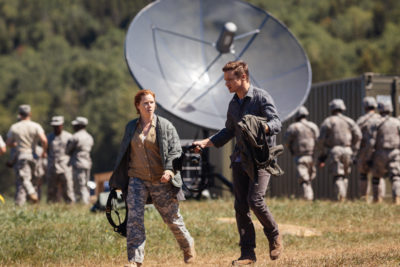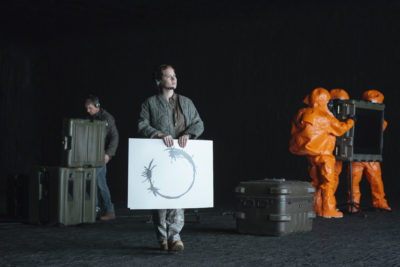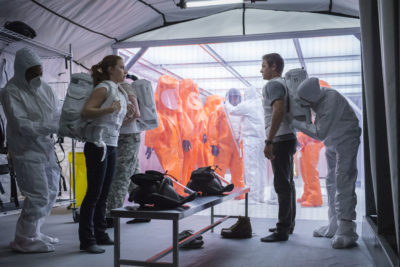
Amy Adams as Louise Banks in ARRIVAL by Paramount Pictures
Denis Villeneuve’s Arrival is a First Contact movie to rival 2001: A Space Odyssey or Close Encounters of the Third Kind.
The arrival of twelve alien spacecraft – hovering over twelve apparently random places on Earth – creates a race between nations to find a way to communicate with them. Answers to several questions are foremost in everyone’s minds – but most importantly, what is their purpose?
Based on story by award-winning science fiction Ted Chiang – originally entitled The Story of Your Life – Arrival posits the idea that communication/language is the most important invention of a civilized species – then it takes that idea to another extreme: a language that affects one’s perception of time.

(L-R) Amy Adams as Louise Banks and Jeremy Renner as Ian Donnelly in ARRIVAL by Paramount Pictures
When the aliens arrive, each country where they’ve landed (or, well, hovered) undertakes to learn how to communicate with them – and, at first, they share their intelligence with each other. That is, until the Chinese team breaks off contact over a phrase they’ve translated as ‘give weapon.’
The American team – headed by linguist Dr. Louise Banks (Amy Adams) and theoretical physicist Dr. Ian Donnelly (Jeremy Renner) – makes more progress because Louise refuses to be herded into unfounded speculation by the military, represented by Col. Weber (Forest Whitaker), and the CIA, represented by Agent Halpern (Michael Stuhlbarg).
When a violent act occurs, it’s not the usual suspects – but it’s one small incident in a film that refuses to play expected action/violence motifs and, instead, works on ideas – on thought and investigation over blowin’ stuff up real good.

(L-R) Jeremy Renner as Ian Donnelly and Amy Adams as Louise Banks in the film ARRIVAL by Paramount Pictures
Key to the story are Louise’s memories of her daughter, Hannah, over the course of her brief life. In her memories are clues to what the aliens might be offering – if everyone could just get along long enough to figure out how to communicate with them.
Misunderstandings complicate things as they always do when there’s a committee of any kind – even when it’s a committee of experts from a dozen nations trying to find out if aliens are trying to destroy us; provoke us to destroy themselves, or goad us into destroying them (or none of the above…).
Villeneuve (Enemy, Sicario) seems to specialize in stories that deal with some kind of alienation (sorry!), though this is the first time that actual aliens from outer space are involved.

(L-R) Amy Adams as Louise Banks and Jeremy Renner as Ian Donnelly in ARRIVAL by Paramount Pictures
Working from a script by Eric Heisserer (The Thing, Lights Out), Villeneuve plays with the First Contact story in a unique way – Arrival is a smart fable about being open and compassionate – and not succumbing to baser emotions and actions when facing The Other.
As is his personal style, he proceeds in an orderly manner and at a deliberate, thoughtful pace – giving his primary cast (Adams and Renner) plenty of time to let us see Louise and Ian as intelligent, compassionate, open people.
Adams and Renner both show considerably more about Louise and Ian through restraint – no over the top expostulations; no plaintive wailing in frustration. Like masters such as James Mason or Rachel Ward, they understand that the camera will pick up – and magnify – their slightest tics and twitches even as it captures the workings of their characters’ minds behind their eyes.

Jeremy Renner as Ian Donnelly in ARRIVAL by Paramount Pictures
Arrival demands tits audience to pay attention. There are twists and turns that are played out over the course of the film – but not one of them is unnecessary; neither do they come out of the blue. Every single part of the film supports every other part of the film in a way that is quite ingenious. There are no accidents or coincidences here.
Paramount’s releasing of Arrival during ‘awards season’ is a bold move – but entirely understandable. It’s a great film.
Final Grade: A+